Which types of porcelain veneers are used? Restoring teeth with porcelain veneers is becoming increasingly popular as the demand for aesthetic improvement among customers, especially women, is growing higher and the trend of beauty enhancement is becoming more widespread.
In recent years, the introduction of porcelain veneers has been widely embraced and preferred due to their superior characteristics compared to traditional porcelain tooth restoration techniques. So, what are porcelain veneers? Which types of porcelain can be used to create veneer facings? Let’s find out in this article with BeDental!
WHAT ARE PORCELAIN VENEERS? WHICH TYPES OF PORCELAIN VENEERS ARE USED?
WHAT ARE PORCELAIN VENEERS? Which types of porcelain veneers are used? Porcelain veneers, or simply veneers, are a modern aesthetic tooth restoration technique using ultra-thin glass veneer facings (only 0.3mm to 0.5mm thick) to provide customers with white, evenly beautiful teeth and a perfect smile.
This is considered a new breakthrough in aesthetic dentistry technology due to its superior characteristics compared to previous porcelain restoration techniques, and it is trusted and chosen by many customers.
Veneer facings are directly bonded to the surface of the natural teeth without excessive enamel reduction, and in some cases, no tooth reduction is required. This helps address the biggest concern of customers – “Do I need to remove enamel for porcelain restorations?” and helps preserve the maximum structure of the natural teeth.
See more: Signs of exposed porcelain teeth
Advantages of porcelain veneers
Preserving the maximum structure of natural teeth: In essence, veneer facings are just ultra-thin glass veneers bonded to the front surface of the teeth, covering the entire outer surface and biting edge. Unlike traditional porcelain restorations, which require reduction of all four surfaces of the teeth, which types of porcelain veneers are used can significantly impact the preservation of natural tooth structure.
At the same time, veneer facings are crafted using modern hydraulic cutting technology, achieving high precision to each tooth’s alignment and achieving a thickness of only 0.3 – 0.5mm. Which types of porcelain veneers are used will determine their durability and fit, as they are only bonded to the outer surface of the front tooth group, meaning porcelain veneers do not require invasive intervention to the underlying enamel surface.
In many cases, even with small or short teeth, which types of porcelain veneers are used can influence whether you need to modify the tooth surface, as certain veneer facings can be directly bonded without affecting the enamel and the ability to chew, as well as the post-treatment discomfort experienced with traditional porcelain restorations.
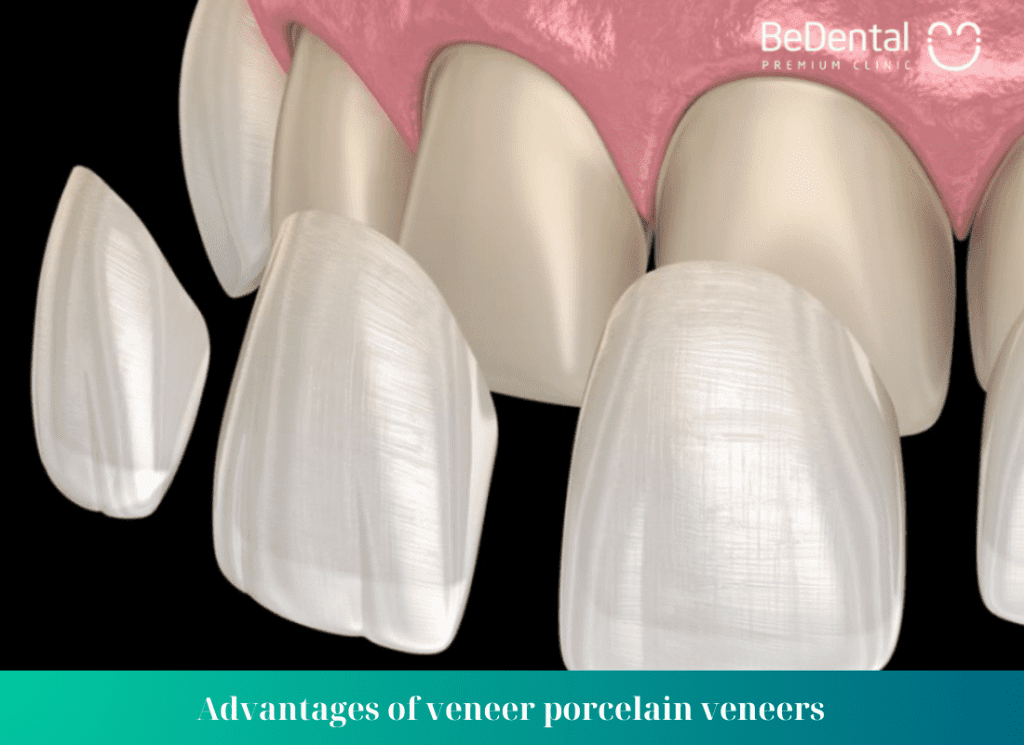
Safe and highly biocompatible porcelain veneers: The veneer facings are crafted from premium glass porcelain material and CAD/CAM technology for precise cutting.
The outer porcelain layer is resistant to erosion, has good stain resistance, high hardness of up to 400Mpa, good strength, and is non-irritating, non-chemically reactive, and highly biocompatible in the oral environment.
Porcelain veneers provide maximum aesthetic results: Through a 5-layer porcelain hot pressing process with modern technology, the thinness of the veneer facings reaches a maximum of only 0.3mm, so the veneer facings have a natural translucency like real teeth while still ensuring bright, even white teeth.
Convenient and quick veneer bonding process: Since veneer facings do not require extensive invasive intervention to the tooth surface by the dentist, nor do they require much time for alignment like porcelain crown methods, the veneer bonding process is very fast and convenient for customers.
Disadvantages of porcelain veneers
Which types of porcelain veneers are used? Porcelain veneers can only be applied to cases where the natural teeth are already fairly even and straight, or cases where the natural teeth are only slightly misaligned. They cannot be used for severe misalignments or bite discrepancies as porcelain veneers cannot correct these conditions.
In addition, due to the meticulous and high technical requirements of the manufacturing process, the cost for each veneer facing is not cheap, averaging from 8 to 12 million VND per tooth.
WHICH CASES SHOULD PORCELAIN VENEERS BE APPLIED?
WHICH CASES SHOULD PORCELAIN VENEERS BE APPLIED? Which types of porcelain veneers are used? Porcelain veneers are an effective tooth restoration method for the following cases:
- Short teeth, mildly worn or cracked teeth
- Uneven gaps or slight gaps between teeth
- Slightly misaligned teeth, uneven sizes of teeth
- Discolored teeth, yellowing due to tetracycline antibiotic staining, smoking, or frequent consumption of colored foods such as tea, coffee, etc., that have been whitened multiple times but have not achieved the desired results.
- Customers who want to change the shape, color of teeth, and translucency of tooth enamel without invasive intervention or minimal tooth reduction.
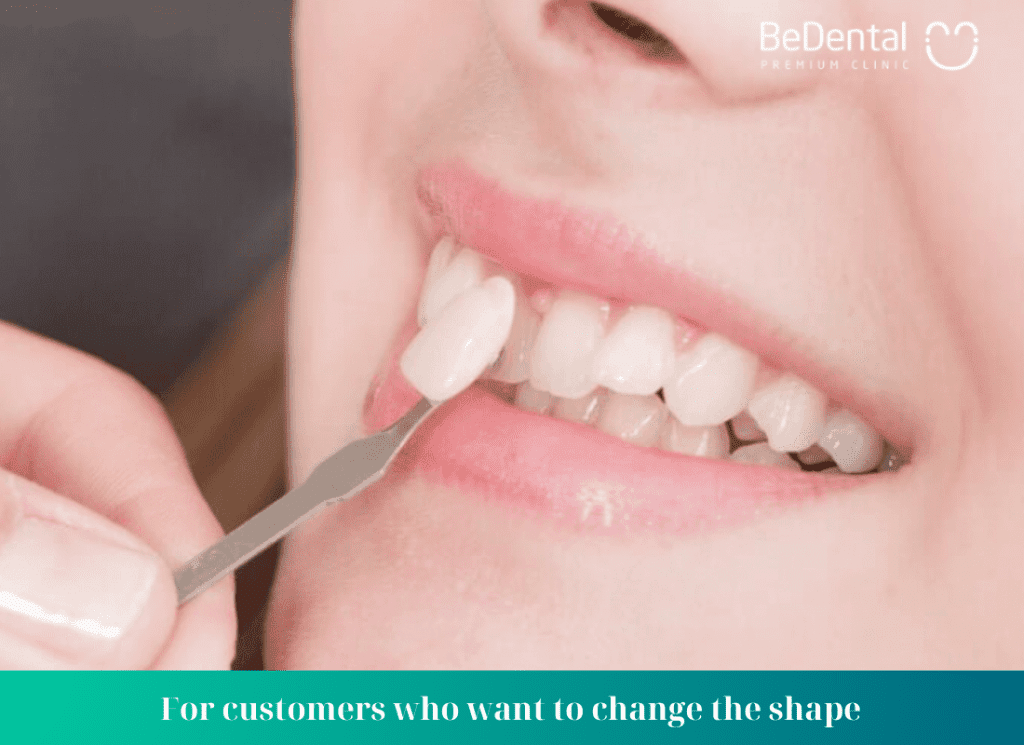
So, which cases should not undergo porcelain veneers?
- Cases of misaligned bite, crooked or severely misaligned teeth
- Gum disease
- Deep cavities, root canal treated or already treated teeth
- Missing teeth or excessive gaps between teeth.
ARE PORCELAIN VENEERS SAFE?
Which types of porcelain veneers are used for safe measures? Porcelain veneers are a cosmetic dental restoration method that provides optimal results in terms of both aesthetics and chewing function, and is becoming increasingly popular.
However, many customers still have concerns about the safety of this method. So, are veneer facings really as safe as advertised?
Potential risks of veneer facings
Excessive invasive intervention on the tooth root
This is a difficult technique to perform in dental restorative procedures, requiring the dentist to have solid expertise and experience to accurately measure the ratio of tooth surface grinding.
See more: Ht-smile excellent advancement
Avoid excessive grinding that can cause imbalance between the tooth root and the veneer facing, making the veneer facing not guaranteed in terms of accuracy and aesthetics, and can also affect your bite.
If you do not choose reputable dental clinics, with dentists who are not highly skilled and experienced, with inaccurate completion of the procedure, it is very easy to cause bacterial invasion into the gaps, leading to tooth decay, bad breath, gum inflammation, and in the long term, bone loss.
Low quality veneer facings
Many unreliable dental clinics choose to use cheap materials, with unknown origins or not biocompatible for the human body, in order to compete in terms of price. They may even take advantage of the customer’s lack of knowledge about veneer facings to replace them with cheap ceramic crowns and perform them using the veneer covering method.
Accompanied by that is the unreliable dental technique, leading to easy cracking of the veneer facings during long-term use, creating conditions for bacteria to invade the gaps, attacking and destroying the tooth enamel, causing various complex oral diseases that, if not detected and treated early, can have serious consequences for oral health.
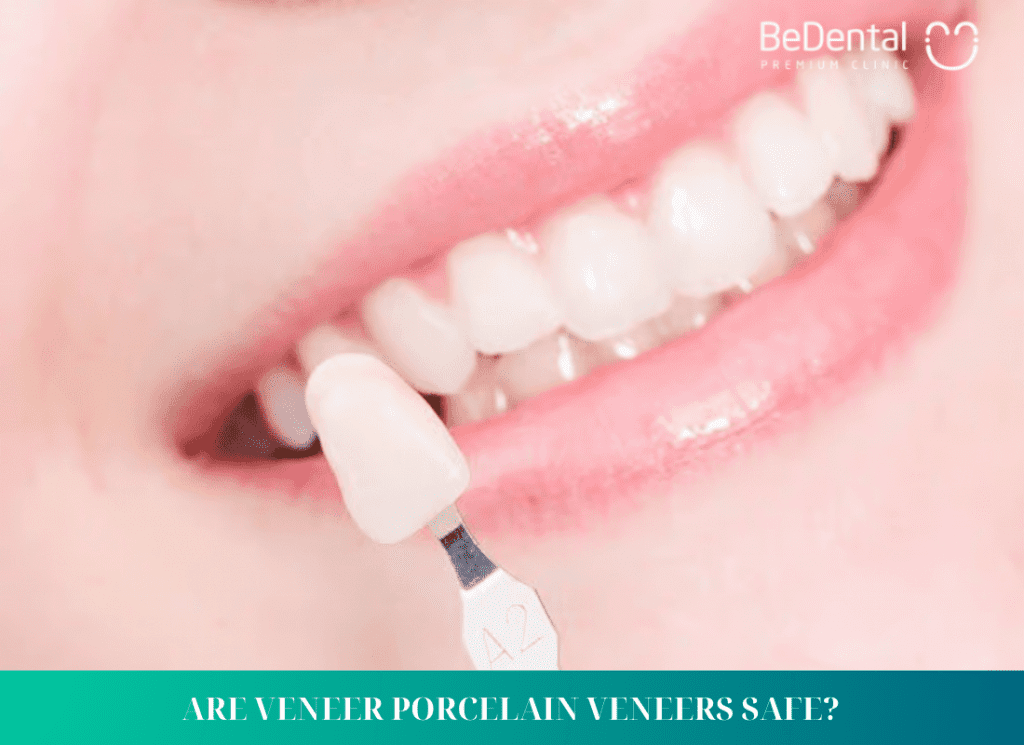
How to safely perform veneer facings?
Before getting porcelain veneers, you need to thoroughly research the dental clinic you plan to choose. Additionally, you need to have the necessary knowledge to understand the current condition of your teeth as well as the veneer porcelain veneer method and its advantages and disadvantages.
Furthermore, you should schedule a specific dental examination before making a decision to get porcelain veneers to determine if you are suitable for this method or not.
Choosing a reputable and quality dental clinic will also ensure your safety during the veneer facings procedure, minimizing invasive interventions, reducing pain and discomfort, and providing specific warranty policies to prevent unfortunate risks during the process, helping the long-term effectiveness of the veneer facings.
What are the types of porcelain veneers facings?
Which types of porcelain veneers are used – Emax Porcelain Veneers
Emax (short for Esthetic Maximum) is a type of teeth made entirely of high-quality glass ceramic material with high translucency, natural-looking just like real teeth. Glass ceramic material has a high level of safety and does not cause chemical reactions in the oral environment. Emax Porcelain Veneers will give you the most natural and beautiful-looking set of teeth.
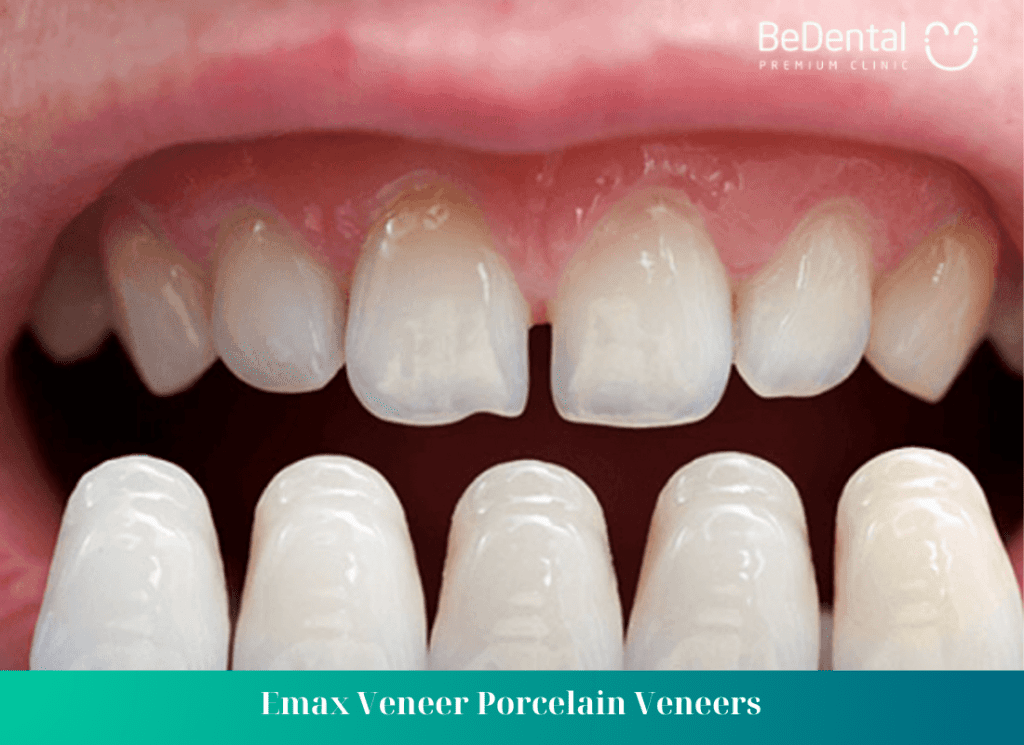
Currently, there are many countries in the world that produce Emax porcelain materials, such as Germany with the Siroma brand, or many advanced medical technology countries like the United States, Japan, etc. In Vietnam, there are two types of Emax porcelain widely used in dentistry, which are Emax Zic and Emax Press.
Which types of porcelain veneers are used – Emax Press Porcelain Veneers
Crafted on the world’s leading CEREC technology production line, Emax Press porcelain veneers incorporate all the superior features compared to traditional porcelain crowns, with exquisite design down to the smallest details of the tooth’s texture and a bright white color that achieves a natural translucent effect, just like real teeth.
The inner layer is made of Lithium Disilicate glass ceramic material, which is heated at high temperatures of thousands of degrees Celsius. Therefore, the Emax veneer surface has a strong hardness and maximum resistance much higher than that of natural teeth.
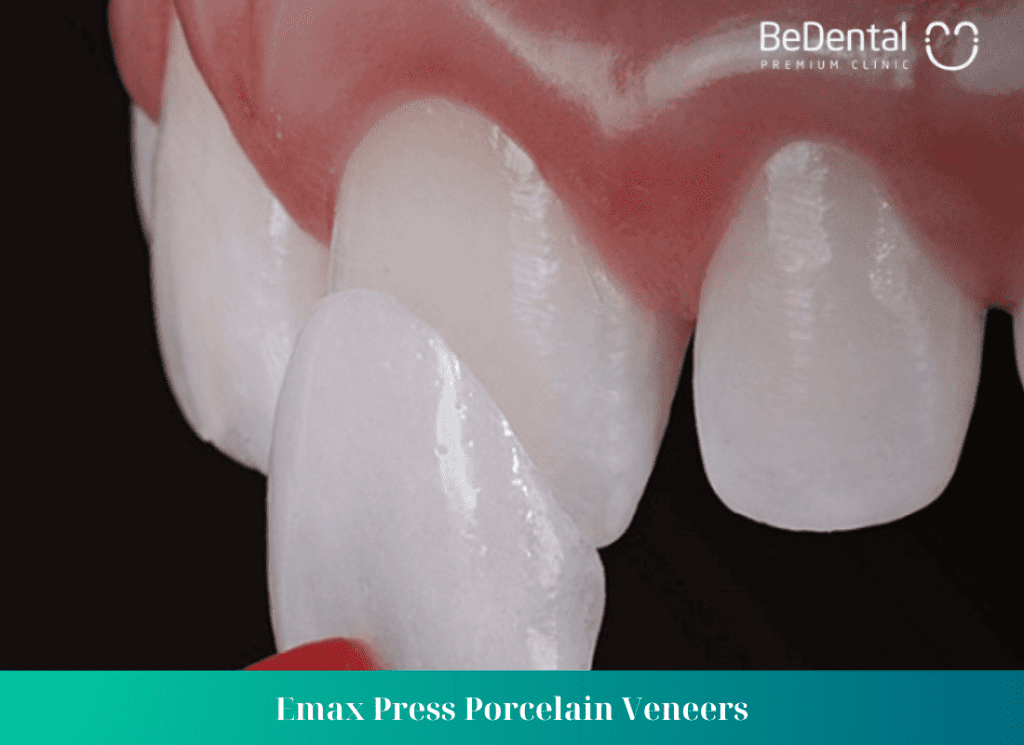
Which types of porcelain veneers are used – Emax Zic Porcelain Veneers
Similar to the Emax Press line, Emax Zic, also known as Emax Zirconia, is made of glass ceramic material with an Emax porcelain coating. However, the core of the tooth is made from zirconium oxide material, which provides a higher level of hardness and durability.
Which types of porcelain veneers are used – Lisi Porcelain Veneers
Which types of porcelain veneers are used? This is a type of all-ceramic tooth from the GC group in Japan, with an ultra-thin structure ranging from 0.3 to 0.4mm. It has a natural white color, good resistance to force, and can be used for both anterior and posterior teeth restorations.
Crafted with CAD/CAM technology and hydraulic cutting technology, Lisi porcelain veneers have high precision due to the hundreds of manually applied ceramic layers on the surface, creating a glossy, bright, and highly translucent effect that is just as natural as real teeth.
Porcelain veneers can be crafted in various shades depending on the customer’s preferences and the natural enamel color of their teeth, ranging from bright white to ivory, translucent white, or opaque white to meet different aesthetic needs.
The thickness of the Lisi veneer is only 0.4 to 0.5mm, but it has a high resilience of up to nearly 800Mpa, which is three times the resilience of natural teeth. This allows you to comfortably chew and eat without worrying about fractures during use.
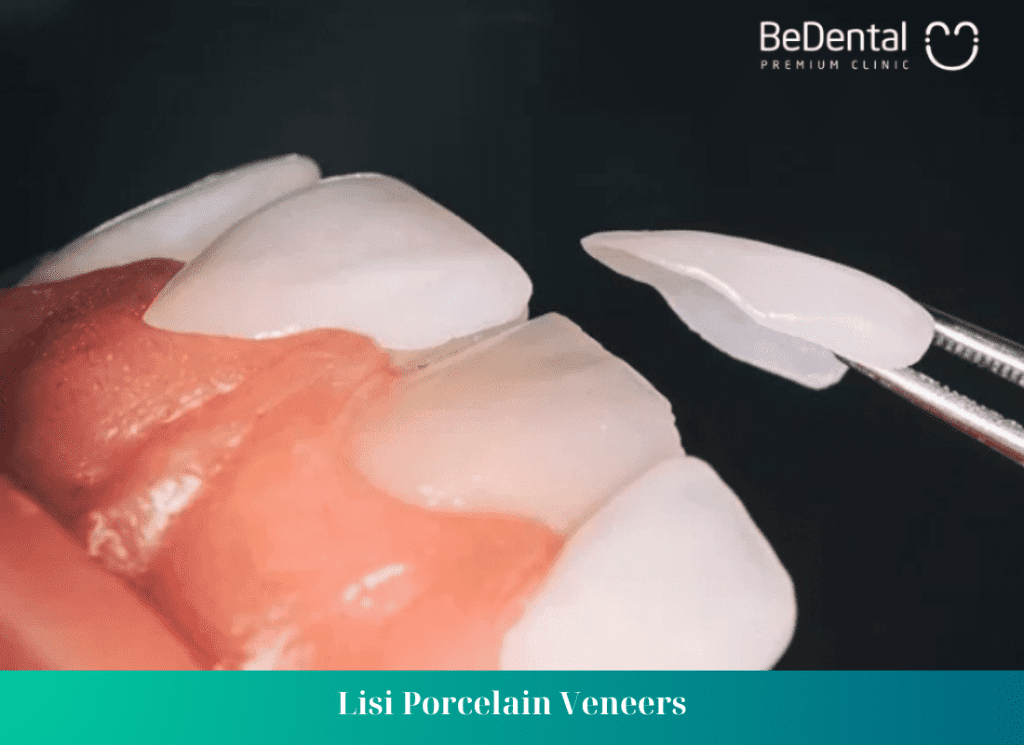
Which types of porcelain veneers are used? Lisi porcelain veneers have a very high biocompatibility, causing no irritation or gum discoloration as Lisi veneers are metal-free. Lisi veneers are also non-conductive, so you won’t experience sensitivity or toothache when eating hot or cold foods.
With many outstanding advantages compared to conventional porcelain veneers, one of the factors that makes customers hesitate when choosing Lisi veneers is the high cost. The average price for one unit of Lisi porcelain veneer is 10,000,000 VND, which is relatively high compared to other types of veneers.
See more: Are porcelain veneers necessary?
However, this cost is completely worth it for a uniformly white and strong set of teeth that won’t chip while chewing.
These are all types of veneers produced with the most advanced technology in dentistry, with superior quality compared to conventional veneers.
They are able to meet all the strict requirements and standards of veneer material, which can only be applied in aesthetic restorations by dental centers that deeply invest in product quality and new techniques.
HOW IS THE VENEER APPLICATION PROCEDURE?
Compared to traditional porcelain crowns, veneer application is much quicker and more convenient because the veneer process does not require extensive tooth preparation.
Moreover, after the veneers are applied, there is no need for a lengthy adjustment process for the bite, as customers will immediately have a bright and confident smile.
Examination, evaluation, and X-ray imaging
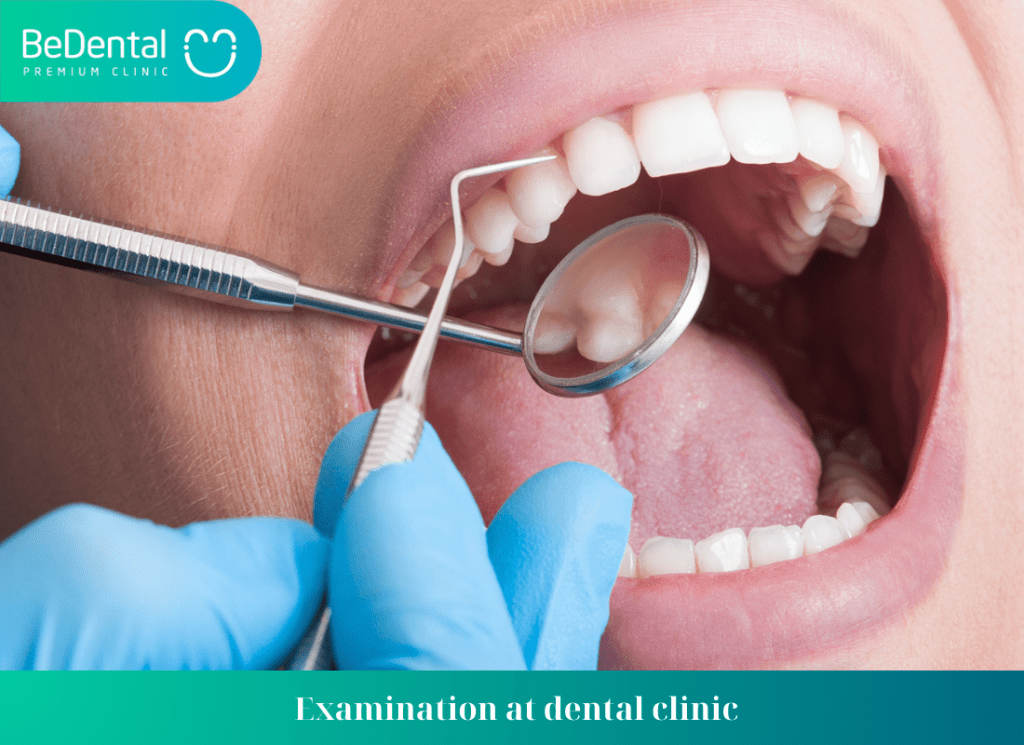
At BeDental dental clinic, customers will undergo a general examination and X-ray imaging to assess the current condition of their oral health using advanced technology equipment and an experienced team of experts. Based on this, the most accurate treatment plan and consultation will be provided.
Impression taking
Based on the examination results and after determining the specific treatment progress, customers will have their dental impressions taken and sent to the lab for the 3D design of their smile, allowing them to envision the exact results of their dental work.
Veneer fabrication
Depending on the current condition of your teeth, the dentist will consider whether to roughen the front surface of your teeth to enhance the bond between the veneers and reduce the risk of veneer detachment. Then, the dentist will proceed to bond the veneers onto your natural teeth using specialized dental adhesives.
Veneer application
First, the dentist will perform a tooth shade test to allow the customer to choose the most suitable veneer color for their needs. Then, the dentist will proceed to etch the inner surface of the veneer and the outer surface of the teeth to be restored.
Next, the dentist will bond the veneers to the tooth structure using specialized dental adhesives, remove excess adhesive, and use a curing light to dry the adhesive, ensuring the veneers are firmly fixed to the tooth surface.
See more: What is zirconia dental crown?
Completion of tooth attachment and scheduling a follow-up appointment
After completing the veneer attachment process, the dentist will check the durability and stability of the veneers, as well as any sensitivity after veneer application, ensuring optimal chewing function and aesthetic results. Lastly, the dentist will provide instructions on oral care and schedule a follow-up appointment to assess the biocompatibility of the veneers after a period of use.
WHERE TO GET TRUSTWORTHY VENEER APPLICATION IN HANOI AND HO CHI MINH CITY?
The cost of veneer restoration depends greatly on the dental clinic you choose for the veneer procedure. Choosing a reputable dental facility will not only help you avoid potential risks but also ensure safety throughout the veneer attachment process.
Currently, BeDental dental clinic is one of the leading dental chains in the field of veneer restoration in Hanoi and Ho Chi Minh City. Schedule an appointment with BeDental today to receive attractive offers for veneer application.
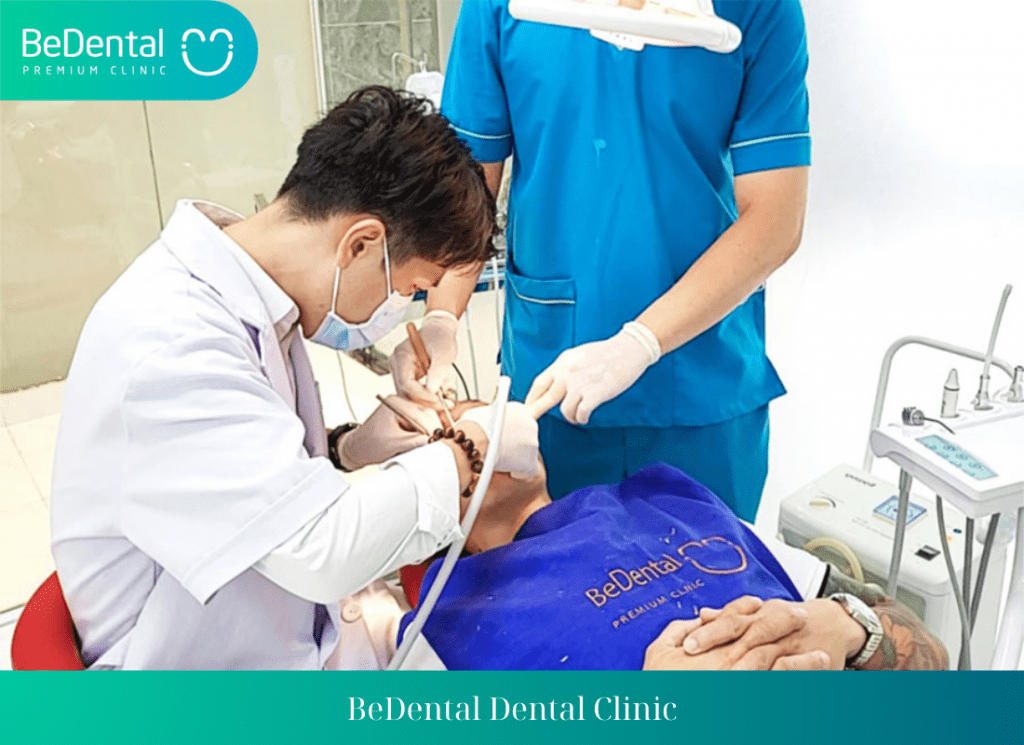
Conclusion
Porcelain veneers have become a popular choice for those looking to enhance their smile with a natural and long-lasting solution. With various options available, it is essential to understand which types of porcelain veneers are used to achieve the best aesthetic and functional results. Whether choosing Emax, Lisi, or other high-quality veneer materials, selecting a reputable dental clinic ensures a safe and effective procedure. By consulting with experienced professionals, you can determine which types of porcelain veneers are used for your specific dental needs and enjoy a beautiful, confident smile for years to come.
Bọc răng sứ
PLEASE LEAVE YOUR INFORMATION IF YOU WANT DENTAL CONSULTATION
| List | Time | Unit | Price |
|---|---|---|---|
| 1.Removable Denture (More detail...) | |||
| Conventional Denture (More detail...) | 2 days | 1 jaw | 4.000.000 ~ 157$ |
| Flexible acrylic partial denture | 2 days | 1 jaw | 5.500.000 ~ 216$ |
| Cast metal partial denture | 2 days | 1 jaw | 4.500.000 ~ 177$ |
| Titanium partial denture | 2 days | 1 jaw | 6.000.000 ~ 236$ |
| 2. False teeth (More detail...) | 2 days | ||
| Acrylic resin teeth -made in Vietnam | 3 days | 1 unit | 350.000 ~ 14$ |
| Acrylic resin teeth -made in USA | 2 days | 1 unit | 600.000 ~ 24$ |
| Porcelain teeth backed with metal | 2 days | 1 unit | 1.800.000 ~ 71$ |
| Denture occlusion | 2 days | 1 unit | 1.000.000 ~ 39$ |
| 3. Non-removable denture : | |||
| Porcelain teeth backed with metal (More detail...) | |||
| Porcelain teeth backed with metal (Ni,Cr) | 3 days | 1 unit | 1.800.000 ~ 71$ |
| Porcelain teeth backed with metal Vivadent France (Cr,Co) | 3 days | 1 unit | 1.800.000 ~ 71$ |
| Porcelain teeth backed with metal Jelenko USD (Cr,Co) | 3 days | 1 unit | 2.000.000 ~ 79$ |
| Porcelain teeth backed with titanium | 3 days | 1 unit | 3.500.000 ~ 138$ |
| Non-metal Teeth : (More detail) | |||
| Porcelain Veneer Katana from Japan | 3 days | 1 unit | 3.500.000 ~ 138$ |
| Porcelain Veneer Venus from Germany ( (7 years Warantee) (Tìm hiểu thêm...) | 3 days | 1 unit | 4.000.000 ~ 157$ |
| Porcelain Veneer Roland from Germany ( 10 years Warantee) (More detail...) | 3 days | 1 unit | 4.800.000 ~ 189$ |
| Porcelain Veneer Roland HD from Germany (10 years warantee) (More detail...) | 3 days | 1 unit | 5.900.000 ~ 232$ |
| Porcelain Veneer Ceramil from Germany (10 years warantee)(More detail...) | 3 days | 1 unit | 6.000.000 ~ 236$ |
| Porcelain Crown Emax from Germany ( 15 years warantee) | 3 days | 1 unit | 7.000.000 ~ 275$ |
| Porcelain Veneer Htsmile from Germany(Bảo hành 15 năm) (More detail...) | 3 days | 1 unit | 7.000.000 ~ 275$ |
| Porcelain Veneer Emax press from Germany (15 years warantee) (More detail...) | 3 days | 1 unit | 9.000.000 ~ 354$ |
| Porcelain Veneer Cercon from Germany (15 years Warantee) (More detail...) | 3 days | 1 unit | 7.000.000 ~ 275$ |
| Porcelain Veneer Nacera from Germany ( 10 years warantee) | 3 days | 1 unit | 10.000.000 ~ 393$ |
| Porcelain Veneer Lava 3M Plus from USA ( 15 years warentee) (More detail...) | 3 days | 1 unit | 9.000.000 ~ 354$ |
| Porcelain Veneer 3M Lava Esthetic from USA (15 years warantee) | 3 days | 1 unit | 12.000.000 ~ 472$ |
| Porcelain Veneer Lisi from Japan (15 years warentee) (More detail...) | 3 days | 1 unit | 12.000.000 ~ 472$ |
| Porcelain Veneer Diamond from USA (lifetime warantee) | 3 days | 1 unit | 16.000.000 ~ 629$ |
You may also want to check out :
Tư vấn chuyên môn bài viết:
BÁC SĨ DƯƠNG THỊ THÙY NGA
BEDENTAL - TOP STANDARD DENTISTRY SYSTEM
In HANOI
Address 1: 7B Thi Sach St, Ngo Thi Nham, Hai Ba Trung Dist, Ha Noi. - 0934.61.9090
Address 2: No 129 Hoang Ngan, Yen Hoa, Cau Giay Dist, Ha Noi. - 0934.61.9090
In HO CHI MINH
Address 1: 53 -55 -57 Pho Duc Chinh St, Nguyen Thai Binh, Dist. 1, Ho Chi Minh. - 0766.00.8080
Working: 9am - 8pm everyday
Website: https://bedental.vn/en/





